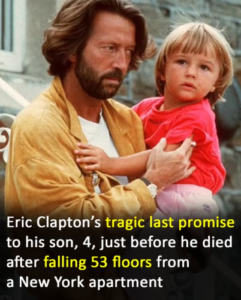Eric Clapton held his four-year-old son, Conor, close. He had just taken him to the circus, their first solo outing together. Conor’s laughter still echoed in Clapton’s ears as the boy excitedly talked about the acrobats, the lions, and the dazzling lights. Clapton, often absent, had made a silent promise to himself—he would be there more, be a real father. No more missing out. No more regrets.
The next morning, Clapton was due to pick up Conor for a trip to the Bronx Zoo. He was filled with anticipation, eager for another day of bonding. But before he arrived, tragedy struck.
A housekeeper had been cleaning the windows of Conor’s mother’s 53rd-floor apartment. One window, normally kept shut, was left open by mistake. Conor, curious and playful, ran through the hallway, unnoticed for just a moment. That moment changed everything.
He slipped through the open window. There was no scream, no warning—just an unimaginable silence after the fall.
Clapton arrived to chaos. The unthinkable had happened. His son, his bright-eyed boy, was gone. The pain was unbearable. The promise he had made to be there, to never miss another moment, shattered in an instant.
Grief consumed him. There were no words, only pain. For months, he withdrew from the world. Then, slowly, he found solace in music. From the depths of his sorrow, he wrote Tears in Heaven—a song that would touch millions but could never bring his son back.
“I must be strong and carry on,” the lyrics went, though Clapton felt anything but strong. Each performance was a plea, a farewell, a whispered apology.
Another song, Circus Left Town, was his personal goodbye. It captured their last joyful night together, the promise unfulfilled, the love that would never fade.
Years passed, but the pain never truly left. Clapton found a way to live again. He married, had more children, and continued his music. But every time he played Tears in Heaven, he remembered. The promise he made, the promise he couldn’t keep, and the little boy who had forever changed his heart.
